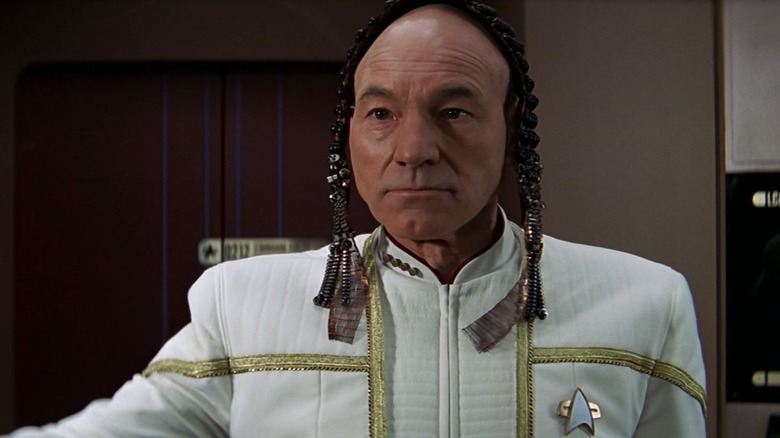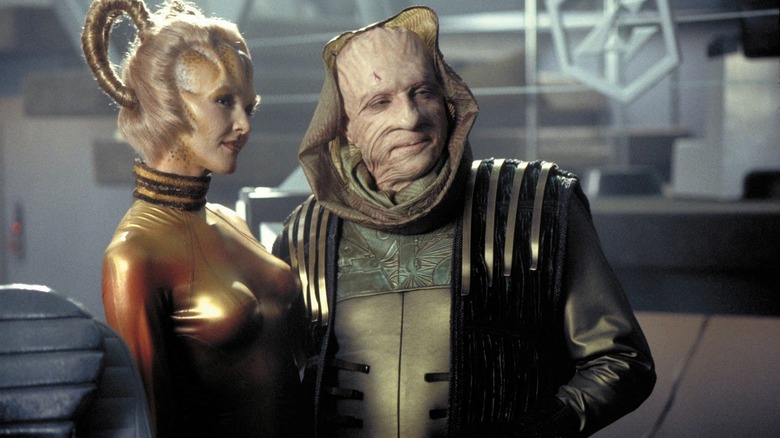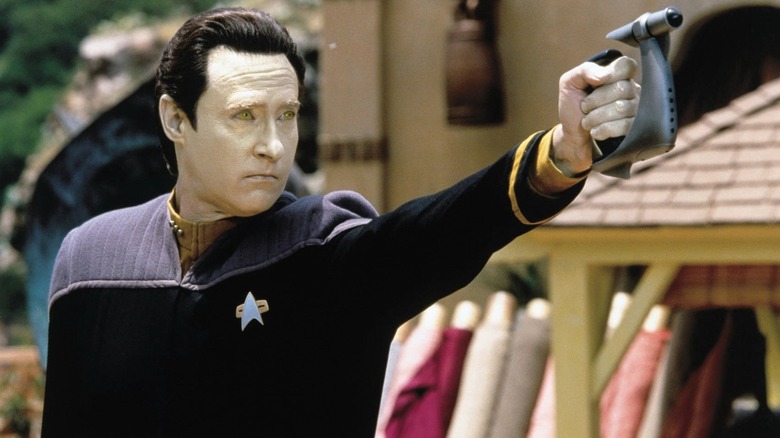Patrick Stewart Flat-Out 'Rejected' The First Script For Star Trek: Insurrection
Jonathan Frakes' 1998 film "Star Trek: Insurrection" is hardly the most celebrated of the 13 extant "Star Trek" movies. The film wasn't terribly well-reviewed when it was released, and a general fan consensus seems to dictate that it may be the least of the four films based on "Star Trek: The Next Generation."
Notably, "Insurrection" looks cheap. The bulk of the film's action takes place on the Ba'ku homeworld, but the filmmakers were unable to do anything to make it look appropriately alien. The exteriors were filmed in Thousand Oaks, California, as well as the Sierra Nevada mountain range, and, well, it looks like they just shot the film in California. Additionally, the Ba'ku were given no alien makeup, leaving them looking like regular old people. Worst of all, the Ba'ku costume designs were unbearably boring, as everyone was draped in loose-fitting, off-white hippie-wear that even mannequins would be embarrassed by.
The story was also a tired retread of the "Next Generation" episode "Who Watches the Watchers" (October 16, 1989), wherein Starfleet officers, secretly ensconced among a primitive species, are accidentally revealed. In "Insurrection," an evil species called the Son'a aims to rob the Ba'ku homeworld of life-giving, fountain-of-youth-like radiation and forcibly relocate its few inhabitants. Picard (Patrick Stewart) is ordered to help but defies orders after falling in love with a Ba'ku (Donna Murphy).
According to the oral history book "The Fifty-Year Mission: The Next 25 Years: From The Next Generation to J. J. Abrams," edited by Mark A. Altman and Edward Gross, Stewart hated the original script for "Insurrection" and handed it back to screenwriter Michael Piller in disgust. That was, as Piller said, "a dark day."
Star Trek: Conflict
Michael Piller recalled:
"Patrick rejected the first draft I had written, and, let me tell you, that was a very dark day. At the same time, and I mean this sincerely, it wasn't the script he was reacting to, but the first story. And he was right. No writer likes to hear that, but I can say without hesitation that the conflicts with Patrick, and although he was right about the story, the direction we took from there we had a great deal of conflict over regarding his character. I felt they were points I had to win to make the script work."
Early ideas for "Insurrection" included a sci-fi rendition of Joseph Conrad's "Heart of Darkness," wherein Picard would be sent on a dangerous mission to retrieve a mad soldier gone rogue. Piller once noted that he also conceived of a story where Picard kills Data (Brent Spiner) after the android malfunctioned. It may have been that last story that Patrick Stewart objected to.
Eventually, Piller, producer Rick Berman, and the other filmmakers all began to focus on a story based on political ethics. Would you help forcibly relocate 600 people if it provided a technology that could save lives, cure disease, and defy aging? Piller said:
"We had long and difficult conversations, letters and meetings, and without a doubt that script is far better as a result of that conflict. It certainly is important to realize that from conflict with people who really care about the material, and are really smart, good results can come. The result here, I think, is one of the most interesting roles that Picard has had to play in a 'Star Trek' story."
Maybe in the films, anyway. Picard faced similar challenges on the small screen frequently.
Star Trek: Insurrection's many messages
"Insurrection" is ultimately muddled, dull, and, as stated above, cheap. But reading the filmmakers' theories on the movie as it was being made, one can see what they were getting at. F. Murray Abraham, who plays the selfish, vain, and murderous Son'a captain Ru'afo, noted that "Insurrection" was about the dangers of vaunting technology over the natural world. Director and actor Jonathan Frakes zeroed in on the ethics, seeing Admiral Dougherty (Anthony Zerbe) as being happy to sacrifice 600 lives for a potential disease cure-all, while Picard focused on the human cost. All of those ideas are in "Insurrection," but the film also wanted to involve action and adventure, and ended up being neither a treatise nor a thrill ride.
Picard, Michael Piller posited, was still a starship captain, and he was always busy and overwhelmed. The Ba'ku homeworld was an agrarian paradise of tech-rejecting immortals who had the ability to slow down and enjoy the quiet of nature. It gave Picard something to fight for. Piller felt this was a timely story, saying:
"[Information] overload became the theme of the next decade. What we find at the beginning of this picture is Picard caught in an avalanche of details. His arc, his journey, is that by going to this planet and finding a group of people who worship each moment of life, he learns a little bit [...] and he finds a way to look at life in a slightly different way than he came. And ultimately as the movie ends, he plans to bring that appreciation to the Federation Council and tell them to slow down a little bit."
Patrick Stewart ultimately made the movie, pleased with the script. It's a pity the final product wasn't as grand as that.


